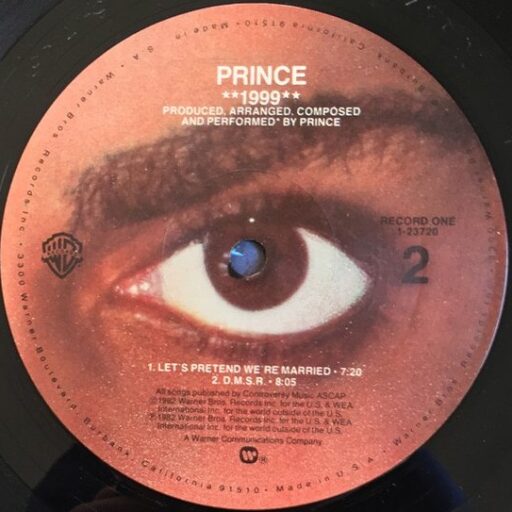In our last post, I invoked that reliable old standby of pornographic schlock, the Penthouse Forum letter, as a point of comparison for Prince’s early 1976 song “Don’t You Wanna Ride?” Since we’re treading in similar thematic waters today, I guess now is as good a time as any to talk about the roots of the porn aesthetic in Prince’s musical persona.
Cultural critic Touré has written convincingly about how Prince’s rise to infamy coincided with the mainstreaming of pornographic imagery in American society in the 1970s and 1980s (Touré 72). As we’ll see in the weeks and months to come, porn aesthetics figured heavily in Prince’s developing persona, from the Dirty Mind album to Vanity 6 to the Purple Rain film. But its influence also (allegedly) went back much earlier, to his childhood–the proverbial “origin myth.” There’s a recurring story of a nine- or ten-year-old Prince coming across his mother‘s collection of pornographic literature; in some versions, she left it out deliberately, in a kind of passive-aggressive effort to teach him about the “birds and the bees.” “I think there was some kind of plan to initiate me heavy and quick,” Prince recalled in a 1997 television interview with comedian Chris Rock, “so I was given Playboy magazines, and there was erotic literature laying around that was very easily picked up… it was pretty heavy at the time. I think it really affected my sexuality a great deal” (VH1 1997).
There was erotic literature laying around that was very easily picked up… I think it really affected my sexuality a great deal.
(The Artist Formerly Known as) Prince
It certainly affected his songwriting. Like its contemporary “Don’t You Wanna Ride?”, “Rock Me, Lover” is thoroughly grounded in the conventions and preoccupations of teenage sexual fantasy. It differentiates itself, however, in a few key ways. First, if the former song takes after Jimi Hendrix, then the latter has more of a James Brown feel; the riff Prince scratches out on his acoustic guitar sounds very much of a piece with the syncopated rhythm work pioneered by Jimmy Nolen during his tenure with Brown’s band. This sort of “Funk 101” guitar would, of course, remain one of the principal tools in Prince’s musical arsenal. Second, and more intriguingly, while “Don’t You Wanna Ride?” is at its heart a lowest-common-denominator fantasy of domination, “Rock Me, Lover” finds Prince taking a step forward, toward the formulation of his own, uniquely submissive brand of seduction.
Touré writes that “Prince worships women so much that in his songs he usually gets turned out by them. His stories were less about ‘This is what I’ll do to you,’ than ‘This is what I want you to do to me’” (Touré 83). This is certainly the case with songs like the aforementioned “Little Red Corvette” and “Darling Nikki,” in which much of the erotic charge comes from Prince’s character being overwhelmed by a powerful, if not predatory woman. In “Don’t You Wanna Ride?”, as we observed last time, Prince won’t allow himself to be overwhelmed: he needs to take control of the song’s “foxy lady” and show her who’s in charge. But even the title of “Rock Me, Lover” demonstrates a more passive approach. This time around, Prince’s character stands in awe of the woman: in the song’s raunchiest line, “Lover, you sure know how to cream,” he even humbly gives her full responsibility for her orgasm.

Of course, this submissive approach is indebted to pornographic tropes, just as much as the dominant “Don’t You Wanna Ride?” Sadism and masochism have been the poles along which heteronormative porn aligns itself, practically since there was such a thing as heteronormative porn. But there’s something nevertheless appealing, if not outright radical, about a man so brazenly offering himself to a woman. Prince’s submissive seduction, Touré writes, “had a way of empowering the women he was speaking about, giving them agency and sexual force, rather than making [them] bodies or conquests” (Touré 83). This is something, quite frankly, that many of today’s wannabe R&B lotharios fail to recognize. Women have been hearing about what men are going to do to them and how long and how hard for years–long enough, certainly, to know that it’s usually an empty boast. Part of the appeal of Prince, for many women, was that he wasn’t afraid to let himself be the one who gets “rocked.”
None of which is to say that the issue of dominance was an entirely settled question for Prince in 1976. Indeed, he’d continue to wrestle with his obvious insecurities through much of his career, and a reactionary machismo would frequently rear its head in his lyrics; for every “Little Red Corvette” there’s a “Lady Cab Driver,” for every “Girl” there’s an “Irresistible Bitch.” But it’s telling that the Prince everyone seems to remember isn’t the spiteful, controlling little prick from the second act of Purple Rain, but the soft, beguiling, gender-fluid creature he portrayed in songs like “Do Me, Baby” and “Adore”: a figure whose immersion in the sex act was so complete, his (considerable) ego threatened to disappear entirely. “Rock Me, Lover” may not be a masterpiece on its own merits; but it’s still important, because it shows that even as a teenager, Prince was already learning how to let go.

Leave a Reply to Zach HoskinsCancel reply